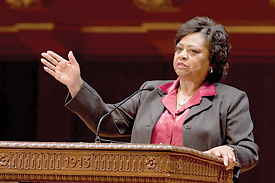Related story:
As a girl picking cotton under the hot Georgia sun in the early 1960s, all Shirley Sherrod could think of was getting away. But the death of her father — shot by a white farmer over a livestock dispute — changed everything.
“It just suddenly dawned on me that you cannot leave the South. You can stay here and dedicate your life to working for change. I started working that summer with the Student Nonviolent Coordinating Committee,” said Sherrod, the keynote speaker for the Martin Luther King Jr. Symposium. “It was ‘we the people.’ We got strength from each other.”

“We the people need to work together as brothers and sisters across racial lines to make our communities and our country a better place,” former USDA official Shirley Sherrod said during the MLK Symposium keynote address. Photo by Martin Vloet, U-M Photo Services.
“We the People … Realizing the Dream,” the theme for the 25th annual MLK Symposium, echoed throughout Sherrod’s address Monday at Hill Auditorium, and other speakers returned to the theme in honoring King.
“Building diversity is the work of many people — we the people,” said President Mary Sue Coleman. “‘We the people’ — it’s the theme of this year’s symposium, and it is the essence of our university. Because an inclusive culture is our greatest strength as a community.”
Sherrod, who has worked to promote farm cooperatives in her native Georgia, came to national prominence last year after she became Georgia Rural State Director for the U.S. Department of Agriculture.
But in July, she was forced to resign after video excerpts of her remarks at an NAACP event seemed to suggest that she, as a federal official, racially discriminated against a white farmer. Further study revealed the video was taken out of context and that Sherrod actually was conveying an opposite meaning.
“It didn’t seem real,” Sherrod recalled. The USDA responded by offering her another job, which she declined.
Sherrod said her experiences as a civil rights worker prepared her for the media firestorm that followed the misrepresentation of her remarks. “When you’re coming from the truth, when you’re coming from right, you don’t have to worry,” she said.
She said she will continue to speak of her personal experience. “I use my life and my story to move beyond the issue of race,” she said.
“We the people need to work together as brothers and sisters across racial lines to make our communities and our country a better place for our children and our grandchildren for many generations to come,” Sherrod said.
In her remarks, Coleman noted that besides 25 years of celebrating the life and legacy of King, U-M is marking other milestones in the effort to achieve greater diversity.
U-M was the first university in the country to create an office to serve lesbian, gay, bisexual and transgender students, and this year it is celebrating the 40th anniversary of the Spectrum Center. She also said it was 40 years ago that the university pledged to better serve students of color.
“Today that pledge takes the form of the William Monroe Trotter Cultural Center and the Office of Multi-Ethnic Student Affairs, two campus institutions that serve students of color and promote diversity at Michigan,” Coleman said.
In opening the program, Lester Monts, senior vice provost for academic affairs and senior counselor to the president for the arts, diversity and undergraduate affairs, recalled his studies of American government as a boy attending segregated schools in Little Rock, Ark., and that the founding fathers had counted Africans as three-fifths of a person. He also recalled the despair in the voices of Southern blacks living under discrimination.
“But Dr. King never lost faith in the democratic principles set forth in the Constitution and subsequent amendments,” Monts said. He added that even after King was jailed, “He urged fellow protestors to keep their faith in the democratic system.”

